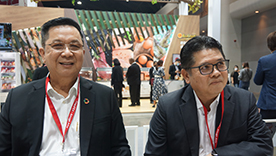Despite African swine fever, the coronavirus pandemic and marginal growth in Vietnam’s economy, CPF Vietnam has recorded 35% sales growth in the first half of 2020, according to Montri Suwanposri, president.
The first outbreak of coronavirus in the country in March and a second in July did not affect the company because the crisis was contained swiftly, he said.
Vietnam managed the outbreaks rapidly, making it one of only a few countries in Asia that saw positive economic growth in the first half of 2020, he added.
To build on that success, CP Vietnam has built a new poultry complex in Binh Phuoc which is the most sophisticated operation of its kind ever built in Vietnam. The complex contains broiler and breeder farms, a feed mill, and a food processing facility for products going to Europe, Japan and the Middle East.
Mr Montri added that the plant worth US$250 million will supply 50 million birds/year in the first phase from 2019-2023. Production will hit 100 million birds/year in the second phase.
The poultry complex is forecast to generate annual turnover of US$100 million in the first phase ending in 2023, and then revenue will double to US$200 million in the 2nd phase. The first shipments to Japan of yakitori will be delivered in Q1, 2021.
The operation in Binh Phuoc province covers Dong Xoai city, Binh Long town, as well as the districts of Dong Phu, Chon Thanh, Hon Quan, and Bu Dang.
Broilers in the complex will not be vaccinated against bird flu virus because the farms are isolated and the product is designated for export. One of the operation’s key strengths is its proximity to Japan.
He said CP Vietnam will sustain growth up to 10-12% in 2020 with earnings of US$3.5 billion. The windfall comes from hogs which constitute more than 50% of its business, with the rest poultry, aquaculture, feed, food and more.
Food chain integrity
Sooksunt Jiumjaiswanglerg, CPF director, said CPF has strengthened its screening processs to thwart the coronavirus from getting into the food chain. It has prepared plans so that the business can recover critical business operations if workers are infected.
A continuity plan has been prepared with operating procedures in case of emergencies and the company works closely with the Vietnamese authorities in determining steps to prevent business interruptions. No matter how severe the coronavirus outbreak might become, workers have to be safe, he stressed.
For example, working hours have been extended to build sufficient stocks of feed, meat and food to supply customers, Mr Sooksunt added.
Vietnam’s government sees food as a strategic industry and emphasizes that food producers should be able to steadily supply food to the Vietnamese people in all circumstances.
At this moment, the company is appraising risks and keeping sufficient cash to ensure smooth operations.
ASF has wiped out more than 40% of the hog population in Vietnam, mainly small and medium-sized farms. CPF Vietnam’s contract growers, who supply around 1.5 million hogs/year, have not been affected by ASF due to tight biosecurity practices.
It will probably take Vietnam a few years to restock. Therefore, CP Vietnam’s hog business will grow strongly until at least 2023.
Dwindling hog populations have driven hog prices above 80,000 VND, up 108% y-o-y. Gross profit margin in the hog business is above 18%. Furthermore, chicken prices

